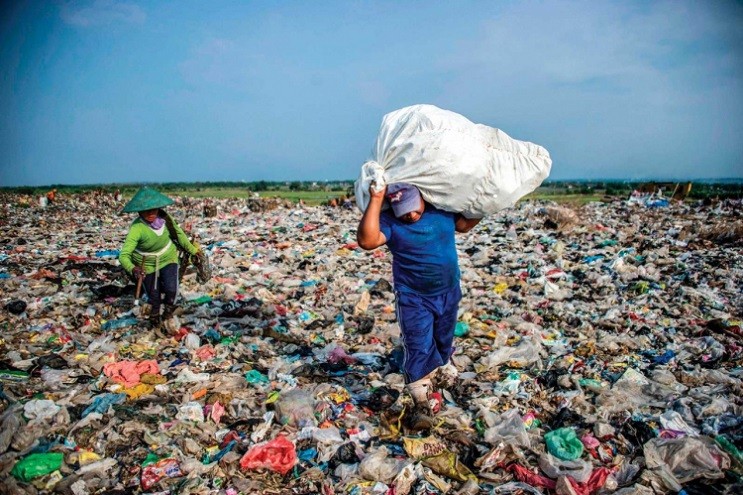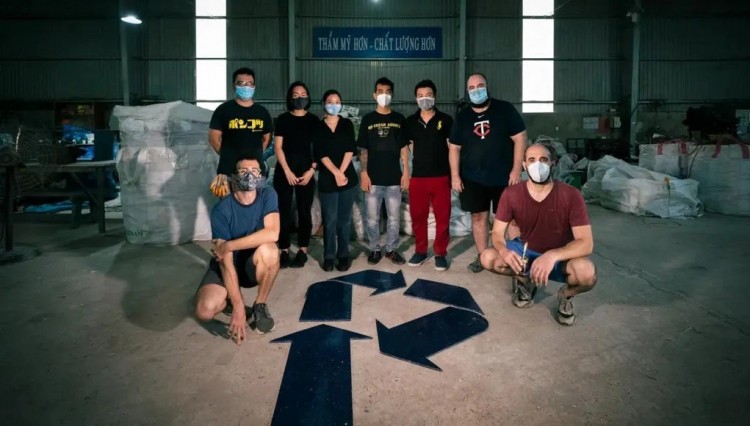
Plastic waste and ASEAN actions
Latest
 |
| The challenge of plastic waste has become a shared concern in the world. (Photo: AFP) |
Heralded as a miracle material in the mid-20th century, plastics now touch every aspect of daily life worldwide. But the explosion of plastic waste poses significant threats and associated costs to public health, livelihoods and the environment.
Since 1950, humans have produced more than 8 billion tons of plastic, more than half of which went straight to landfills and only about 9% of which was recycled.
According to the World Economic Forum (WEF), it is estimated that, on average, the world generates about 400 million plastic waste every year, and there are currently between 75-199 million tons of plastic in our oceans. Without action, the amount of waste entering the ocean could triple or even more over the next two decades.
A hot spot for plastic pollution
Southeast Asia has emerged as a hot spot for plastic pollution, with its rapid urbanization, rising middle class and inadequate infrastructure for waste management.
The study published by the WEF in 2021 shows that the 10 countries that discharge the most plastic into the ocean are: Philippines, India, Malaysia, China, Indonesia, Brazil, Vietnam, Bangladesh, Thailand and Nigeria. Out of the above 10 countries, there are 5 countries in the ASEAN region, including the Philippines, Malaysia, Indonesia, Vietnam and Thailand.
A report by the Ocean Conservancy Society and the McKinsey Center for Business and the Environment revealed that five countries in Asia (including China, Thailand, Vietnam, Indonesia and the Philippines) were experiencing a booming demand for consuming products but lack of the infrastructure to handle waste, especially in dealing with the rise of plastic bags and becoming the top countries causing plastic leakage into the ocean.
Research by the World Bank (WB) shows that more than 75% of the material value of plastics is lost (valued at nearly 6 billion USD per year across all three countries, Malaysia, Philippines and Thailand) when plastics are discarded after a single use rather than recovered and recycled.
According to the World Bank, Indonesia generates around 7.8 million metric tons of plastic annually and is the second-largest marine polluter, after only China. Nearly 5 million metric tons of plastic waste in Indonesia go uncollected or “disposed of in open dumpsites or leaked from improperly managed landfills”. This mismanaged plastic waste has been a significant threat to Indonesia’s marine environment.
An estimated 3.1 million metric tons of plastic waste is discharged onto land in Vietnam annually. At least 10 percent of this mismanaged waste leaks into the waterway. According to a WB report in July 2022, the majority of plastic waste polluting the oceans in Vietnam is single-use, low-value items such as plastic bags, food containers or straws.
The working group implementing the National Plastics Action Partnership Program in Vietnam (NPAP Program) said that the amount of plastic waste entering the waterway system could double by 2030, if the process of current waste collection, recycling and treatment in Vietnam has not been improved. And COVID-19 has been a pandemic of plastic, triggering huge increases in the consumption of masks, sanitizer bottles, online delivery packaging and other single-use items.
Governments and humans are unknowingly bogged down in improper plastic production, consumption and disposal systems, causing countless negative impacts on people and the environment. Because of its insoluble characteristics, plastic waste affects the environment for hundreds to thousands of years and has a significant impact on the lives of current and future generations.
 |
| Plastic People is a Vietnamese startup ranked in the top 5 of the Plastic Waste Recycling Challenge. (Photo: Plastic People) |
ASEAN actions
Facing the above-mentioned issues, countries across Southeast Asia have set up plans of actions and laid out road maps for building and circular economies which prioritize plastics-related policies.
Recognizing the transboundary nature of marine plastics, ASEAN released the Bangkok Declaration on Combating Marine Plastics in 2019.
On 28 May 2021, the Association launched the ASEAN Regional Action Plan for Combating Marine Debris in the ASEAN Member States (2021 – 2025).
“The ASEAN Regional Action Plan for Combating Marine Debris in the ASEAN Member States is testament of our collective and forward-looking response to the challenge with the aim of supporting regional policies, platforms and aligning resources to complement existing country's actions,” H.E Dato Lim Jock Hoi, Secretary-General of ASEAN said.
The Action Plan represents a milestone for ASEAN, signifying a renewed, bolder collective commitment through regional actions, aligned with national agendas towards tackling a critical environmental challenge.
The Incubation Network, in partnership with the Global Plastic Action Partnership, UpLink by the World Economic Forum, and the Alliance to End Plastic Waste, have recently launched the Plastic Waste to Value Southeast Asia Challenge to tackle plastic waste mismanagement in the region.
Established to accelerate innovative solutions that are focused on plastic recycling and upcycling in Indonesia, the Philippines, Thailand, and Vietnam, the challenge is exciting to unveil five innovators that will be participating in the tailored development program over the course of five months.
As an active member of ASEAN, Vietnam has pioneered many strong action programs to tackle the problem of plastic waste pollution. In particular, the Law on Environmental Protection 2020 has officially taken effect from January 1, 2022 with the addition of regulations on the reduction, reuse, recycling and treatment of plastic waste; Limit the use of single-use plastic products and plastic bags.
In the National Action Plan for Management of Marine Plastic Litter by 2030, Vietnam targets to cut marine plastic litter by 50 percent by 2025, and by 75 percent by 2030.
Some measures have been put in place, such as the impending ban on producing and importing plastic bags for domestic use by 2026 and most single-use plastic products by 2031.
Similarly, in Thailand, since 2014, the government of this country has made waste treatment a priority on the agenda with policies to reduce the use of plastic bags and plastic bottles at government agencies and businesses, and at the same time ban plastic items at tourist destinations.
In 2022, Thailand officially banned 4 types of single-use plastic, including thin plastic bags with a thickness of less than 36 microns, foam food containers, plastic straws and plastic cups.
In order to achieve the goal of increasing the country's plastic waste recycling rate to 50% by 2022 and 100% by 2027, Thailand needs to be more resolute in preventing plastic pollution, although there are still many challenges to the segregation and collection of waste on the ground.
Particularly in Cambodia, many large supermarkets have applied a fee of 0.1 USD/plastic bag to reduce the use of plastic bags. In Laos, the country is encouraging the use of recycled bags in public areas, instead of plastic bags.
The Indonesian government has pledged to spend 1 billion USD a year on reducing plastic waste in the sea by 70% by 2025. Malaysia is also considering banning the use of plastic bags.
In the Philippines, although there is still no nationwide ban on the use of plastic bags, some local governments have begun to control the use of plastic bags. Some shopping centers have also replaced plastic bags with paper bags, and encouraged customers to use reusable bags and bring their own bags to store goods, instead of using plastic bags.
Anchalee Pipattanawattanakul, an ocean campaigner with Greenpeace in Southeast Asia, said the region needs a coordinated strategy on plastic waste.
According to Susan Ruffo, Ocean Conservancy's managing director for international initiatives, “this is not just a government responsibility, corporations, social organizations and citizens all have a part to play," she said.
ASEAN has been working towards sustainability by changing the way plastic products are used. Accordingly, the region needs to have stronger regulatory frameworks, with more innovative business models.
In particular, governments need to have specific mechanisms and policies to realize the circular economy to help businesses have the opportunity to access capital to invest in sustainable production models that reduce plastic waste.
| Top 5 best innovators selected from the Southeast Asia Plastic Waste Recycling Challenge: TerraCycle Global Foundation (Thailand): TerraCycle Global Foundation provides simple, innovative, and high impact solutions to prevent, remove, and recycle waste from the environment. Bank Sampah Bersinar (Indonesia): Bank Sampah Bersinar is a social enterprise that provides community-based waste management solutions. ENVIROTECH WASTE RECYCLING INC. (Philippines): Envirotech collects single-use plastics (SUPs) and turns them into useful products. Kibumi (Indonesia): Kibumi is a disruptive startup company that strengthens the plastic recycling supply chain through digitalized and modernized waste collection points. Plastic People (Vietnam): Plastic People transforms plastic waste into useful and upcycled products such as furniture or accessories. |

















